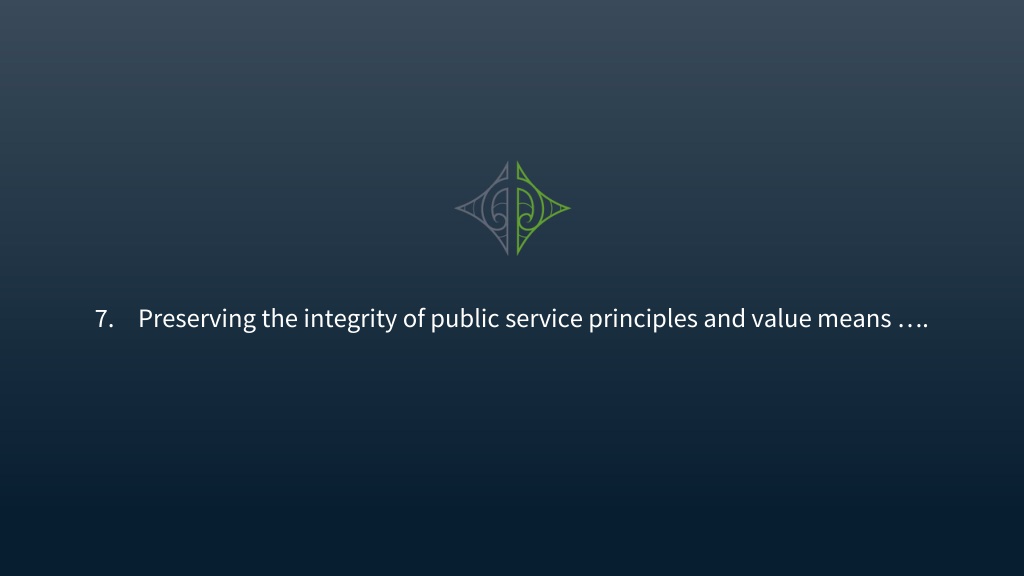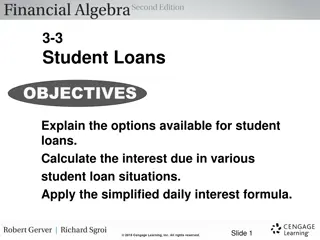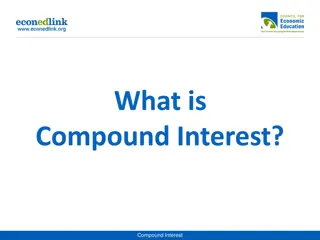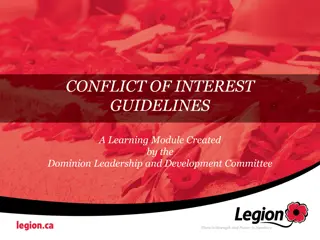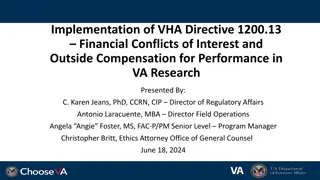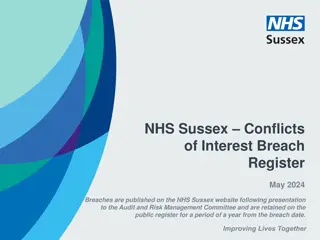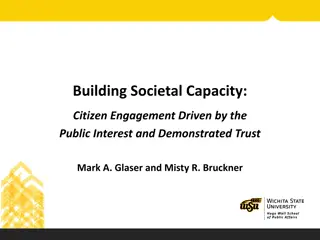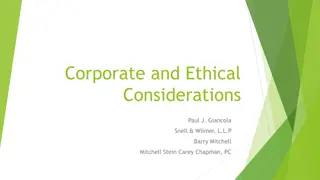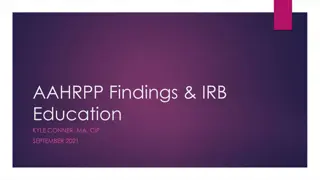Understanding Conflicts of Interest in Public Service Governance
Preserving the integrity of public service involves actively considering and disclosing conflicts of interest before and after appointment to a board. It is essential to disclose financial benefits, relationships, and interests that may impact decision-making. Proactively managing conflicts of interest is crucial, with strict guidelines on voting and participation in board activities. The Public Service Act 2020 applies to Crown agent boards, emphasizing the importance of upholding public service principles.
Download Presentation

Please find below an Image/Link to download the presentation.
The content on the website is provided AS IS for your information and personal use only. It may not be sold, licensed, or shared on other websites without obtaining consent from the author. Download presentation by click this link. If you encounter any issues during the download, it is possible that the publisher has removed the file from their server.
E N D
Presentation Transcript
7. Preserving the integrity of public service principles and value means .
you will have actively considered conflicts of interest for accepting your appointment Before appointment, a prospective board member must disclose to the Minister the nature and extent of all interests that they have, or are likely to have, in matters relating to the entity. The responsible Minister is required to confirm, in the submission to APH, that this disclosure has been made. The nature of the interests to be disclosed are specified in legislation (see next slide). Note that before appointment as a board member, the person must (a) consent inwritingto being a member; and (b) certify that theyare not disqualifiedfrombeing a member; and (c) disclose to the responsible Minister the nature and extent (including monetary value, if quantifiable) of all interests.
following your appointment, you should continue to disclose interests Interests must be disclosed if you: may derive a financial benefit (including remuneration as an employee) are the spouse, de facto partner, child or parent of a person who may derive a financial benefit have a financial interest in a person to whom the matter relates are a partner, director, officer, board member, or trustee of a person who may have a financial interest in a person to whom the matter relates may be interested because of a provision in the entity s Act are otherwise directly or indirectly interested in the matter ( interests are not only financial).
and, if practicable, proactively manage any conflicts of interest that arise A board member of a statutory entity, who has an interest (as defined in legislation): must not vote or take part in any discussion or decision of the board relating to the matter or otherwise participate in any activity of the entity that relates to the matter must not sign any document relating to the matter must be disregarded for the purpose of forming a quorum for any part of a meeting of the board relating to the matter. Exceptions to these requirements may be made by the chair if they are satisfied it is in the public interest.
.. that if you are on a Crown agent board, you are aware of how the Public Service Act 2020 applies to you Crown agents are made part of the public service in relation to the purpose of the public service, principles, values and spirit of service Boards of Crown agents are responsible for ensuring that the entities they govern uphold the public service principles when carrying out their functions (s12) Boards of Crown agents must preserve, protect and nurture the spirit of service to the community that public servants bring to their work (s13)
you have thought about how the principles and values affect other types of Crown entity The principles and values make sense for all public sector boards and support the Code of Conduct Crown entities experience a high level of public scrutiny and accountability. A Crown entity board is directly accountable to Parliament, and the Chair may be summoned to answer select committee questions on conduct and performance. The Official Information Act and Public Records Act apply More generally, Crown entities are often much more in the public eye than a commercial or non-government organisation, often with strong media interest The Crown Entities Act sets out specific requirements of boards and directors on issues such as conduct and integrity that go beyond those required of commercial or NGO boards Ministers expect their Crown entity to behave prudently and sensitively, and in keeping with public sector values
.. you understand that political neutrality matters As an apolitical Public Service, our reputation stands and falls on being trustworthy, transparent and impartial. It is vital public servants adhere to the expectations placed on them and maintain the trust and confidence of New Zealanders Trust is important. It provides legitimacy for the Public Service to act, to serve communities and improve the lives of New Zealanders. The New Zealand Public Service enjoys high levels of public trust and confidence, and is focused on delivering better services and outcomes for New Zealanders. There can also be greater scrutiny of the actions of the Public Service during an election year, and it is important that we maintain our high standards of integrity and conduct and the political neutrality of our agencies.
and having high standards of conduct for board members and for employees The Commissioner has issued a Code of Conduct for Crown Entity Board Members New board members should become familiar with their board s policy manual or charter; in particular, its standards of integrity and conduct setting out explicit expectations in relation to potential probity issues. Boards should satisfy themselves that their entity s own code of conduct and practices reflect the principles of the Standards of Integrity & Conduct for the State Services and related expectations (for example, on offers of gifts & hospitality), and should endorse their adoption for all entity employees.
. You have read and understood the Code of Conduct for Crown Entity Board Members and relevant Model Standards The Public Service Commissioner has issued: a Code of Conduct for Crown Entity Board Members which applies to the board members of statutory entities (excluding corporations sole) and Crown entity companies (excluding Crown Research Institutes and their subsidiaries) a Code of Conduct for the Directors of Public Finance Act 1989 Schedule 4A Companies. The Commissioner s Model Standards Model Standards set out the Commissioner s minimum expectations for agencies and staff in the public sector on specific integrity areas. These include: Positive and Safe Workplaces , Information Gathering and Public Trust, Speaking up, Conflicts of Interest, Chief Executive Gifts, Benefits and Expenses, and Workforce Assurance
you are aware that during an election year . official Information Act requests should continue to be handled in a timely and appropriate manner public servants intending to stand for Parliament must inform their employer, and stand down from their positions by Nomination Day in the case of staff covered by the Electoral Act senior staff should exercise particular care in discussing their intentions agency premises and other resources should not be used for electioneering. See Commission guidance: He rahitanga P titanga Wh nui | General Election Guidance | Te Kawa Mataaho Public Service Commission.
